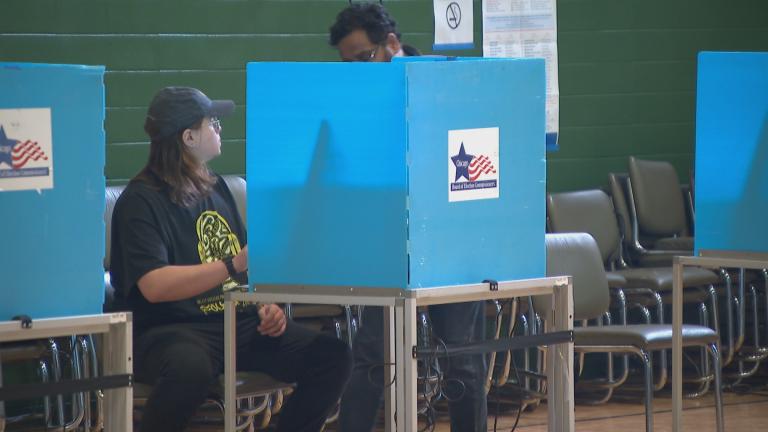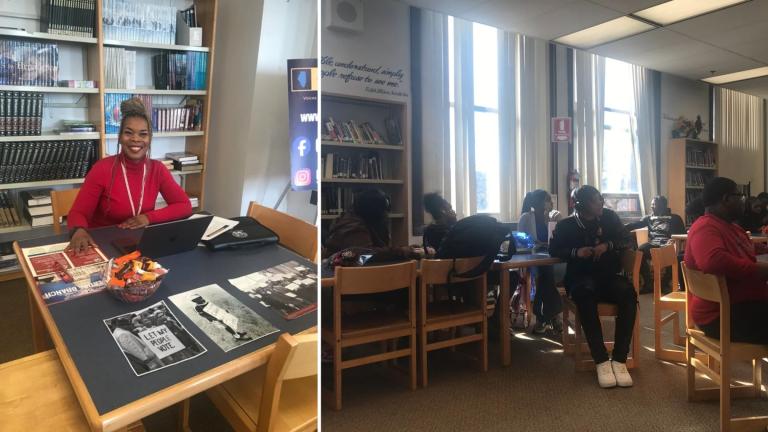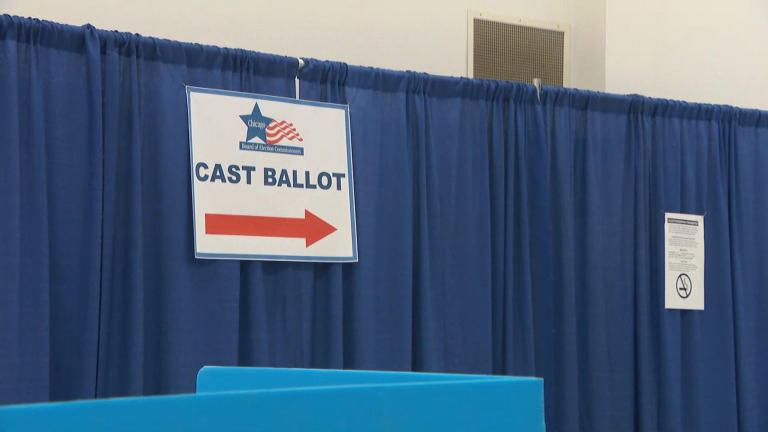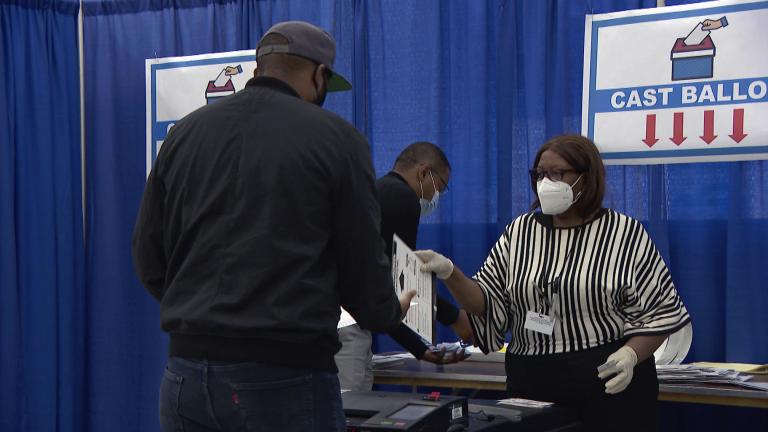Putnam County Clerk Daniel Kuhn is so “overwhelmed and swamped” by the flood of vote-by-mail applications that have been returned to his office in recent weeks that he’s approached the county board for extra money so he can hire extra help.
Kuhn’s proactive approach to readying voters to mail in their ballots for November’s election, versus casting ballots in-person, is one that’s been replicated throughout Illinois.
As part of a new state law passed this spring, local election authorities were mandated to send vote-by-mail applications to approximately 5 million of the state’s residents by Aug. 1.
The fact that Putnam County (roughly a two-hour drive southeast of Chicago in mild traffic) is described by Democrat Kuhn is “swamped” is not unexpected.
READ: You’ve Got Mail: 5 Things to Know About Voting by Mail
Lawmakers are encouraging mail-in voting as a means of propping up participation in the election without risking crowded polling places during the coronavirus pandemic.
Suburban Cook County voters are likewise responding to the call.
County Clerk Karen Yarbrough said that in 2018, 96,000 people voted by mail; already more than 151,000 have applied to do so for this year’s election.
She said her office is ready.
“We can do vote by mail, we do do vote by mail, and it’s been done since the Civil War for crying out loud. This is nothing new for Illinois,” she said. “It’s safe.”
But the Cook County Republican Party on Monday filed a lawsuit seeking to toss out the new law on the basis that it’s meant to disenfranchise GOP voters and harvest Democratic votes.
“Illinois state government is one of the most inept in the Union, and the public has no reason to expect a vote-by-mail system to work any more smoothly than a variety of projects Illinois has stumbled through in recent years,” the suit contends. “Incompetence from the leaders of state government shows that Illinois is woefully unprepared to implement a vote-by-mail system this year.”
Jordan Abudayyeh, a spokesperson for Gov. J.B. Pritzker, said in a statement that the lawsuit “is a desperate political attempt to suppress the vote.”
Yarbrough said it shouldn’t be a partisan issue.
“Republicans vote by mail, Democrats vote by mail, independents vote by mail. This is what we do,” she said. “The only people who are talking about this whole thing about vote by mail — oh my God, and the sky is falling and all of those kinds of things — are people who think maybe they might lose the election in the fall.”
In Springfield, Sangamon County Clerk Don Gray said it’s important and healthy to have difficult conversations about how to make the election transparent and secure before Nov. 3.
“These very high-level criticisms, and encouragements, forces officials such as myself at the local level to have that hard discussion with our constituencies, to be sharp, so that people understand exactly how it operates and that they can have confidence in knowing that we’re looking at these things too, we’re examining them,” Gray said.
Gray, who sits on the U.S. Election Assistance Commission Board of Advisors, said his view on how Sangamon County’s election operations will go is developing due to warnings from the U.S. Postal Service as it contemplates a flood of mail-in ballots.
Illinois requires election authorities to count any and all ballots postmarked on or before Election Day (as long as they arrive within 14 days). The post office guidance asks voters to mail their ballots earlier.
“In order to allow sufficient time for voters to receive, complete and return ballots via the mail, and to facilitate timely receipt of completed ballots by election officials, the Postal Service strongly recommends that jurisdictions immediately communicate and advise voters to request ballots at the earliest point allowable but no later than 15 days prior to the election date.
The Postal Service recommends that domestic, non-military voters mail their ballots at least one week prior to their state’s due date to allow for timely receipt by election officials. The Postal Service also recommends that voters contact local election officials for information about deadlines,” the USPS said in a statement.
Illinois’ new law permits election authorities across the state to use drop boxes, where people can drop off their mail-in ballots, postage free and without actually using the postal service (think of it like a mailbox, but only for ballots).
Gray said he’d been wary about the concept.
“That’s the slippery slope into these possibility of these political operatives that perform these schemes of ballot harvesting, that are collecting ballots and then bringing them back secretively in some manner. Not having constant live eyeballs on the process was a concern for me,” he said.
In light of warnings from the USPS — which he said he views as not obstructionist, but a practical acknowledgement of potential troubles given discrepancies between the 50 different state laws and the realities of mail delivery — he is reconsidering, and may employ ballot boxes in Sangamon County.
“I think there’s technology that we may be able to employ, such as live video cameras and recordings and secure-to-the-street boxes that are tamper proof,” he said. "It’s a reality that election authorities need to think through things, like tamper proof and fire proof (ballot boxes).”
He said he has to adapt, given that there’s so much at stake.
“There’s nothing more tragic than someone — not their own fault — attempting to return their own ballot, correctly, the right way and it wasn’t validated or received appropriate and we couldn’t count it. So it’s my responsibility to provide or those options,” he said.
Gray is also reviewing the possibility of curbside voting, which the new Illinois law permits but which poses its own challenges, such as requiring at least two judges to leave a polling place to meet a voter in their car outside during an election when election judges will already have a lot on their plates.
That’s one of the reasons why Gretchen DeJaynes, a Republican who has served as the clerk and recorder of McDonough County for 14 years, said she’s glad the legislature did not go the route lawmakers were originally pursuing — sending actual ballots to registered voters, rather than applications to vote by mail.
The latter route means that anyone who applies to vote by mail will be sent a ballot and an envelope to send it back in.
DeJaynes said she envisioned issues with sending out ballots to everyone that Illinois didn’t have the time to resolve this May when it quickly passed the vote-by-mail expansion law.
“If I send you a ballot you would probably do one of three things with it: You’d vote and send it back to me which is great, you would throw it in the trash and say, ‘I didn’t want this, I never wanted this, I don’t know why you sent it to me,’ or you would keep it,” DeJaynes said.
It’s that last outcome — someone who gets a ballot to vote by mail but who wants to vote in person or who has lost it — that could prove most confusing, for both voters and election judges.
“If you walked into the polling place on Election Day and said, ‘Yes you mailed me a ballot and yes I did receive it but I don’t know where it is, it’s somewhere at home,’ you have to vote a provisional ballot,” she said. “Because you as a voter can have one ballot at a time.”
Election authorities have to hold onto provisional ballots for 14 days after the election “to make sure that you did not mail back to me the original ballot” that was mailed, she explained.
That’s complicated to explain over a long period of time, let alone the short window between late summer/early spring and a consequential election coming up in the fall.
She also said sending ballots to everyone would be more expensive, about $5 per ballot sent to each voter.
DeJaynes said her goal it to “make this election run as smoothly as we possibly can. Let’s be honest, this year, we’re never going to make everyone happy. We’re going to do the best we can. We’re going to get through it,” she said.
The pandemic makes that all the more important, and difficult.
“You know, we’re supposed to run this election according to IDPH (Illinois Department of Public Health) standards,” she said. “We have no idea what IDPH standards are going to be in November. You don’t know what it’s going to be next week.”
Follow Amanda Vinicky on Twitter: @AmandaVinicky








